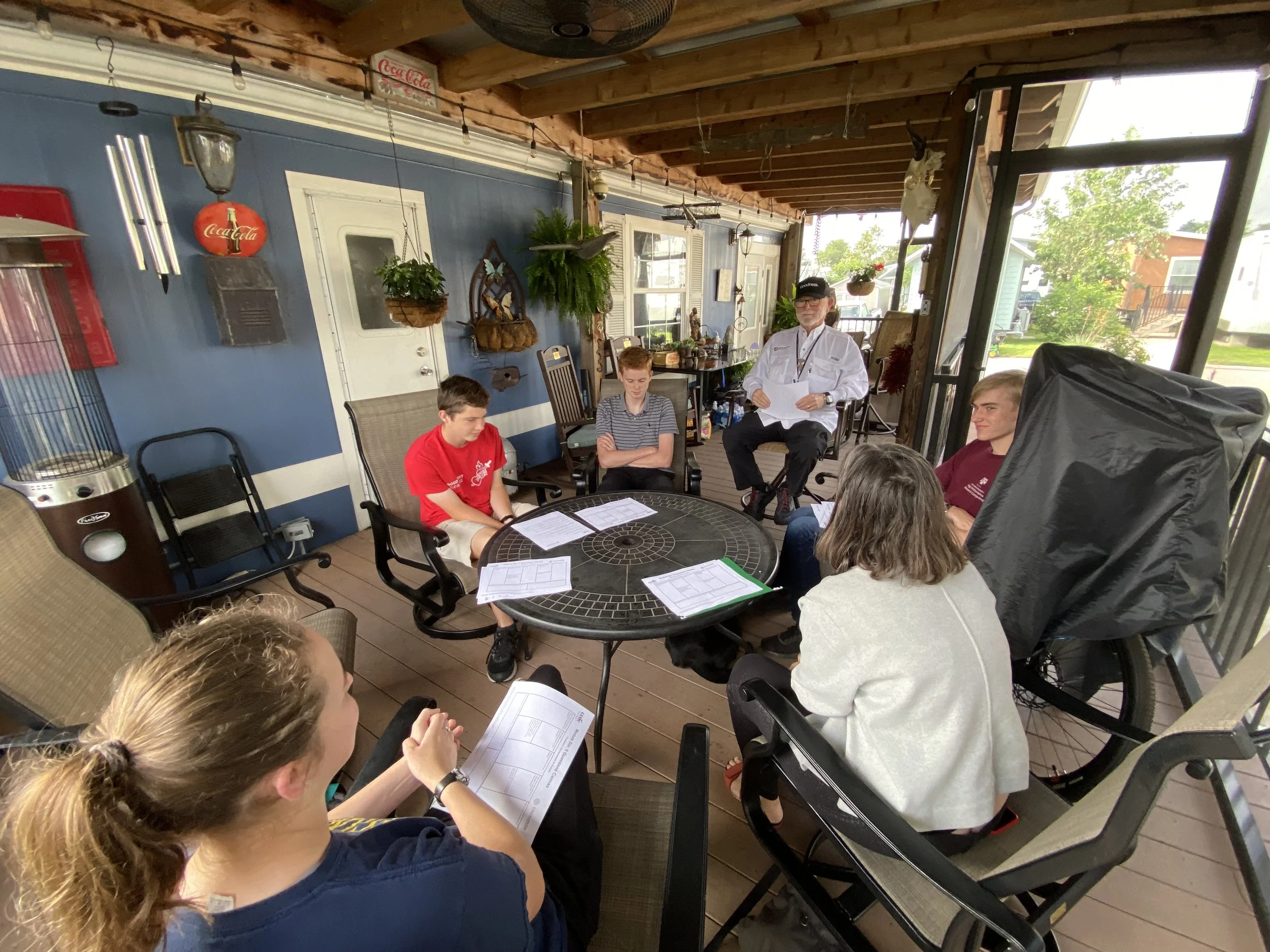High School students Sarah Lanicek and Tim Haunsperger wrote this reflection after meeting with Alan Graham, founder of Community First! Village and Mobile Loaves and Fishes. The interview was part of the Catholic Entrepreneurship and Design Experience from The Catholic University of America, a program that helps students apply principled entrepreneurship to their callings in the Image of God.
Alan Graham is the founder and CEO of both Mobile Loaves and Fishes and Community First! Village. He began his career as a real estate developer, but after his relationship with God became more profound and heartfelt, he began to search for his true vocation.
He found it when he began providing aid to the homeless, starting with nothing but a green minivan, a few dozen sack lunches, and some friends. The relationships Graham built over many years of service helped him to grow his organization from its humble beginnings to impact the lives of countless homeless individuals throughout Central Texas.
Graham has an incredible insight into what entrepreneurship means. He relates Catholicism to entrepreneurship by connecting God’s calling to practical entrepreneurial practices. Everyone is called by God to carry out a particular duty, just as Graham was called to bring community to the homeless. Entrepreneurship is recognizing this call and acting on it. To do this, you must say yes to God unceasingly, take risks, learn from failure, and build relationships. For Graham, the most important of these actions is building relationships. Not only is it fundamental to sustain his business, but it is the root of his solution to homelessness. Alan Graham understands on a spiritual and practical level what an entrepreneur is and how to become one.
Discernment is the precondition to all entrepreneurship. You cannot be an entrepreneur without knowing what God is calling you to do. Graham recounts that he only had an intellectual relationship with Jesus before a retreat at his parish, St. John Neumann, initiated in him a deeper and more heartfelt relationship with God. This spiritual connection led to Graham’s realization of his vocation. So he sacrificed everything to be the best at what he was called to do. In his own words, he became a “serial entrepreneur.” He defines this as an entrepreneur that not only begins to act on a reasonable and attainable level but continues to risk everything to reach new entrepreneurial heights.
Graham notes, however, that having a good heart and fulfilling your heart’s calling is more important than striving for excellent entrepreneurship. Although his calling happened to include “serial entrepreneurship,” others may be called to work on a smaller, less “serial” scale. He provides an example of an old woman cleaning the steps of an orphanage for a living. Is she any less worthy of God’s praise? No. Her heart is what matters, not the scale on which her deeds affect people.
Alan Graham’s solution to homelessness is revolutionary, but it cannot be understood without understanding the problem. Graham observes that some people refer to the homeless by a different name: the houseless. However, he believes that this term is improper. The lack of housing is not the problem, rather it is the outcome of a more fundamental issue. The word “home” connotes a comfort associated with family. Graham believes that homelessness is simply the lack of family. Homeless people are often houseless, but are always homeless. As Graham says, “I have seen homeless people that live in ten-million dollar houses.” The catastrophic loss of family is what leaves so many destitute and is the true cause of homelessness.
Graham discovered this by speaking with hundreds of homeless people over the years. He realized that they all came from broken homes, riddled with death, abuse, or neglect. He recognizes that many people stereotype all homeless people as stupid, depressed addicts. Yes, some may be uneducated. Yes, some may be depressed. And yes, some may have addictions. But two key aspects of homelessness are not being recognized. The first is that the homeless are still humans, and therefore incredibly valuable. Secondly, the root of the problem is the loss of family, not addiction or mental problems. Family relationships are humanity’s natural support system, and their loss is the cause of all the other problems. Graham’s solution is community.
Through Community First! Village, Graham provides the homeless with a new community. He built a place where they can find fellowship, supportive relationships, and meaningful work. Everyone must help support the community by paying rent. In doing so, they are not guests on someone else’s property but residents in their own homes. In these homes, they can find dignity and purpose through the relationships they build with their neighbors.
Another type of relationship critical to Graham’s organization is stewardship. Mobile Loaves and Fishes and Community First! Village cannot function without money, and most of the income is from donations. Graham connects fundraising with friendship. He knows that “People don’t want to be treated like ATM machines.” The most effective way to raise money is to foster a relationship, which means encouraging stewardship, not donorship.
In addition to raising money through relationships, Graham gives a few other tips for “serial entrepreneurship.” Some are evident in his story. He said yes to his calling, and continues saying yes to God, over and over, to this day. He put in the work and took slow, achievable steps to expand his business. He built relationships for help with funding and expertise. Furthermore, he emphasizes the importance of taking risks, making sacrifices, and learning from failure.
In Graham’s eyes, entrepreneurship is a spiritual thing. It means saying yes to God’s calling and pursuing it diligently. He believes that relationships are key both to his solution and to his means of achieving it. He has a deep understanding of what an entrepreneur is and incredible insight into becoming one.


